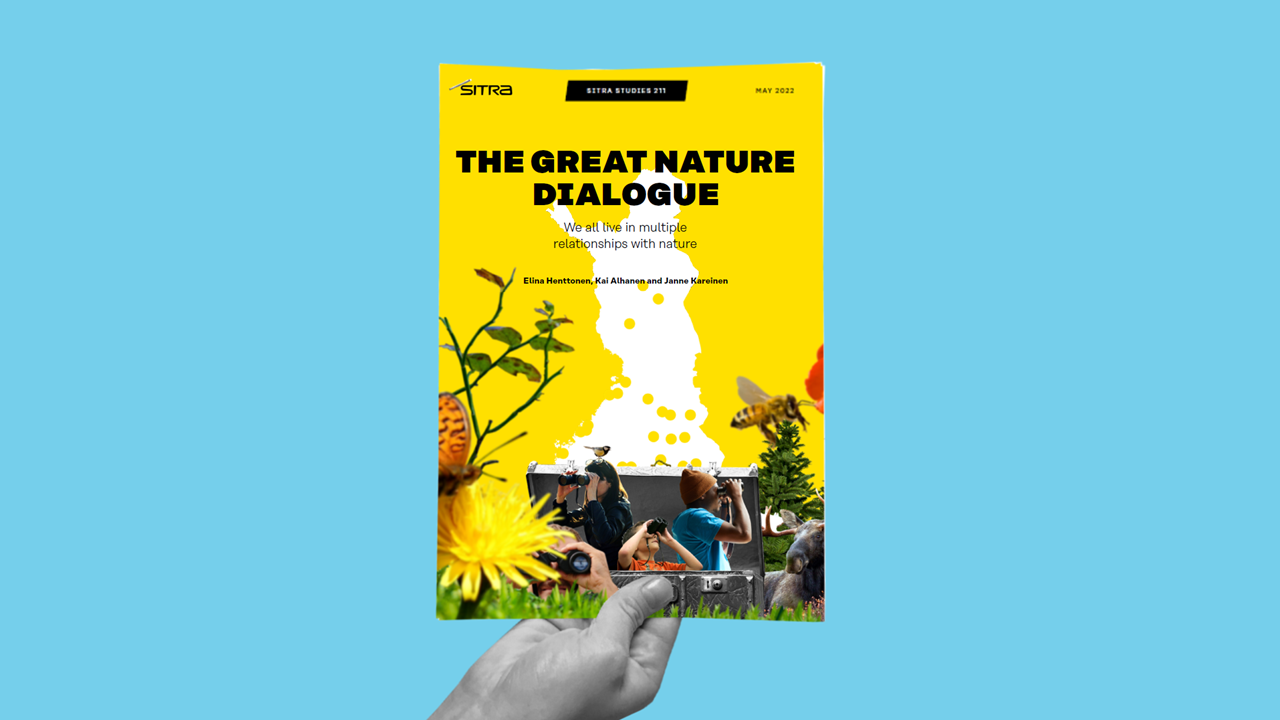The Great Nature Dialogue held in March 2022 discussed nature, its importance and how to stop the loss of biodiversity. The summary of the discussions provides a comprehensive overview of the content and key perspectives of the dialogues. About 800 people took part in the 103 dialogues held in different communities across Finland. The discussions were mainly conducted using the Timeout method.
The aim of the Great Nature Dialogue, organised by Sitra and The Dialogue Academy, was to better understand Finns’ varied relationships with nature and to stimulate discussion on the importance of nature. The summary of the discussions lays a foundation for Sitra’s Nature-wise Finland 2035 (link in Finnish) vision, which is intended to be a realistic picture of a nature-positive Finland – a country where the degradation of nature has been stopped through cooperation. The vision is due to be published later this year.
The people who participated in the dialogue spoke about nature in a rich and nuanced way, their observations, thoughts and feelings reflecting the whole spectrum of human experience. The discussants felt that nature is a central part of people’s life in Finland. It also became apparent that people have very different relationships with nature.
The loss of biodiversity was considered from many different points of view, ranging from everyday observations on the decline of biological diversity to planetary-scale ecology. The main themes of the discussions were the formation of the Finnish relationship with nature and the factors that prevent biodiversity loss and enable stopping it.
The Finnish relationship with nature was discussed in terms of senses and feelings, experiences of security and fear, calm and rapture, and work and livelihood. Participants felt that the obstacles to preventing the loss of nature include the accelerating decline in biodiversity, society being based on greed and overconsumption, confrontations, the consequences of local and global inequalities, and a lack of systemic understanding, vision and empowerment. At the same time, the participants believe that the loss of biodiversity could be stopped by fostering a rich relationship with nature throughout people’s lives, making conscious everyday choices, promoting long-term research and advocacy, popularising knowledge and creating art. Many of the participants hoped that Finland would lead the way in stopping the loss of biodiversity, even in a time of crisis.
The Great Nature Dialogue makes it clear that we all have various parallel, sometimes even strained, relationships with nature. These relationships evolve as our experiences, conditions, life situations and understanding change. The dialogues increased the discussants’ appreciation of the importance of biodiversity, the factors contributing to biodiversity loss and of other people’s different perspectives and experiences. They also gave the participants an opportunity to articulate their relationships with nature in ways and forms that support their own agency. The dialogues were seen as an important and novel way to act together to safeguard biodiversity.
The better we understand the different relationships people have with nature and how these relationships contribute to their willingness to act, the better chance we have of working together to stop biodiversity loss. Dialogue that builds understanding and trust is needed at all levels of society, from local communities to global decision-making, if we are to succeed in halting biodiversity loss.



















Recommended
Have some more.